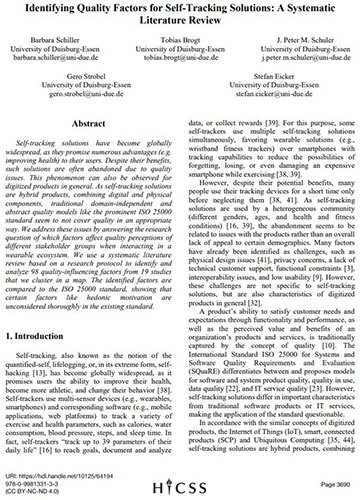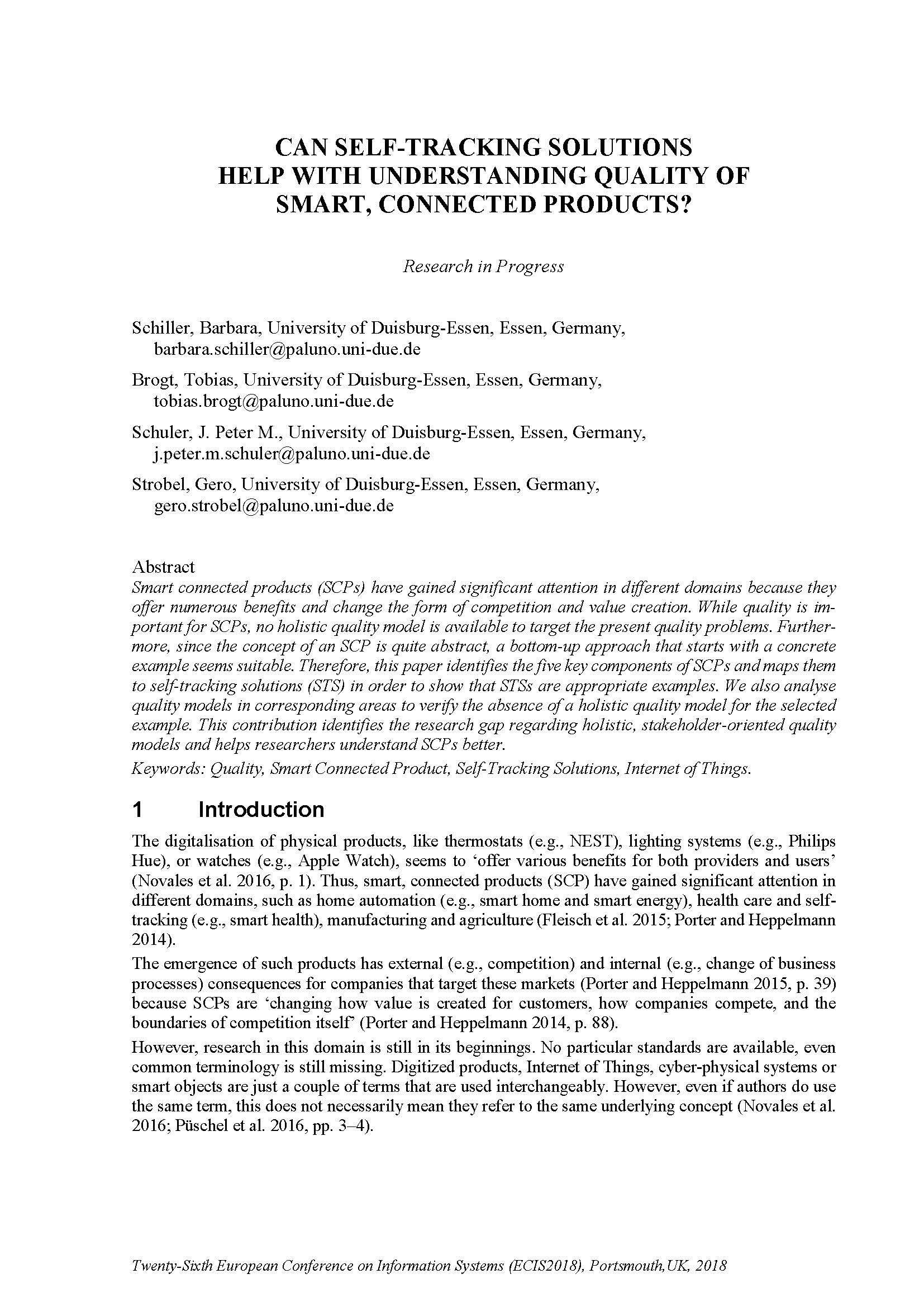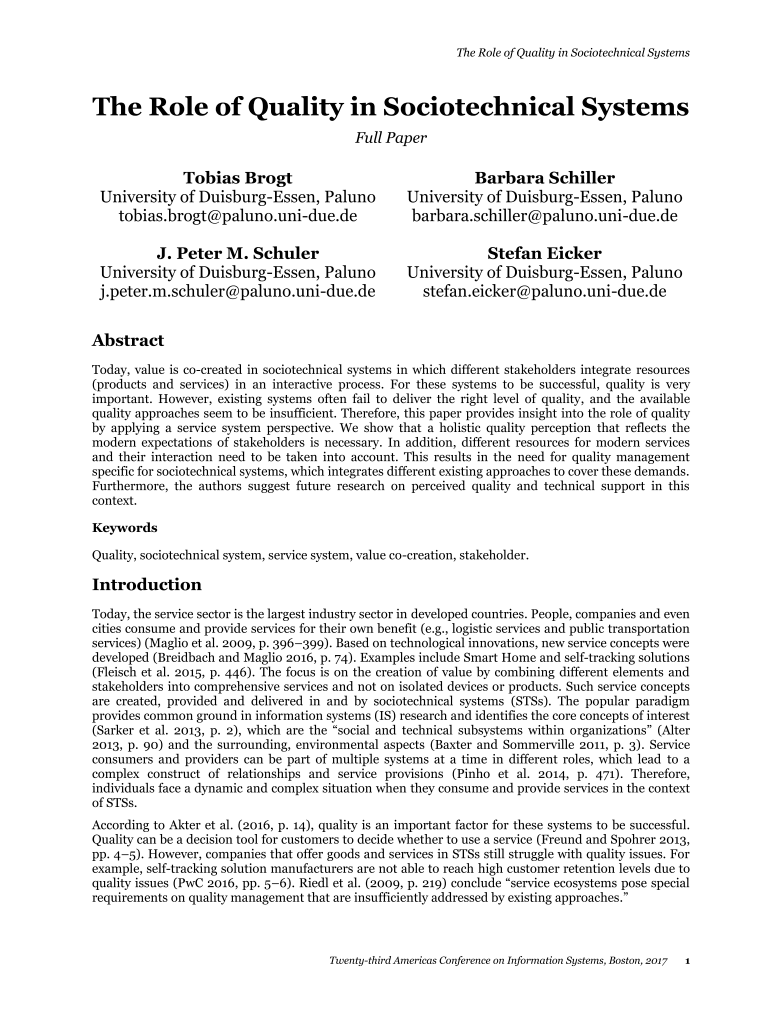Personen

Wissenschaftliche Mitarbeiterin
Barbara Schiller, M. Sc.
- Raum:
- R09 R02 H47
- Telefon:
- +49 201 18-34074
- E-Mail:
- barbara.schiller (at) paluno.uni-due.de
- Sprechstunde:
- Mo 15:00 - 16:00 Uhr, Anmeldung per Mail erwünscht
- Adresse:
- Universität Duisburg-Essen, Campus Essen
Fakultät für Wirtschaftswissenschaften
Lehrstuhl für Wirtschaftsinformatik und Softwaretechnik
Universitätsstr. 9
45141 Essen
Lebenslauf:
- Seit April 2013:Wissenschaftliche Mitarbeiterin am Lehrstuhl für Wirtschaftsinformatik und Softwaretechnik (Lehrstuhlinhaber: Prof. Dr. Stefan Eicker) an der Universität Duisburg-Essen
- 2007-2013: Studentische Hilfskraft am Lehrstuhl für Wirtschaftsinformatik und Softwaretechnik (Lehrstuhlinhaber: Prof. Dr. Stefan Eicker) an der Universität Duisburg-Essen
Ehrungen und Auszeichnungen:
- Nominiert für den Best Paper Award der 53th Hawaii International Conference on System Sciences (HICSS) 2020: Schiller, Barbara; Brogt, Tobias; Schuler, J. Peter M.; Strobel, Gero; Eicker, Stefan: Identifying Quality Factors for Self-Tracking Solutions: A Systematic Literature Review.
- Preis für hochschuldidaktische Innovationen in der Lehrpraxis 2014
Forschungsgebiete:
Smart Connected Products (SCP)
Internet of Things (IoT)
Publikationen:
- Schiller, Barbara; Brogt, Tobias; Schuler, J. Peter M.; Strobel, Gero; Eicker, Stefan: Identifying Quality Factors for Self-Tracking Solutions: A Systematic Literature Review. In: Proceedings of the 53nd Hawaii International Conference on System Sciences. Hawaii, USA 2020. doi:10.24251/HICSS.2020.452BIB DownloadKurzfassungDetails
Self-tracking solutions have become globally widespread, as they promise numerous advantages (e.g. improving health) to their users. Despite their benefits, such solutions are often abandoned due to quality issues. This phenomenon can also be observed for digitized products in general. As self-tracking solutions are hybrid products, combining digital and physical components, traditional domain-independent and abstract quality models like the prominent ISO 25000 standard seem to not cover quality in an appropriate way. We address these issues by answering the research question of which factors affect quality perceptions of different stakeholder groups when interacting in a wearable ecosystem. We use a systematic literature review based on a research protocol to identify and analyze 98 quality-influencing factors from 19 studies that we cluster in a map. The identified factors are compared to the ISO 25000 standard, showing that certain factors like hedonic motivation are unconsidered thoroughly in the existing standard.
- Schiller, Barbara; Brogt, Tobias; Schuler, J. Peter M.; Strobel, Gero; Eicker, Stefan: Identifying Quality Factors for Self-Tracking Solutions: A Systematic Literature Review. In: Proceedings of the 53nd Hawaii International Conference on System Sciences. Hawaii, USA 2020. doi:10.24251/HICSS.2020.452BIB DownloadKurzfassungDetails
Self-tracking solutions have become globally widespread, as they promise numerous advantages (e.g. improving health) to their users. Despite their benefits, such solutions are often abandoned due to quality issues. This phenomenon can also be observed for digitized products in general. As self-tracking solutions are hybrid products, combining digital and physical components, traditional domain-independent and abstract quality models like the prominent ISO 25000 standard seem to not cover quality in an appropriate way. We address these issues by answering the research question of which factors affect quality perceptions of different stakeholder groups when interacting in a wearable ecosystem. We use a systematic literature review based on a research protocol to identify and analyze 98 quality-influencing factors from 19 studies that we cluster in a map. The identified factors are compared to the ISO 25000 standard, showing that certain factors like hedonic motivation are unconsidered thoroughly in the existing standard.
- Schiller, Barbara; Brogt, Tobias; Schuler, J. Peter M.; Strobel, Gero: Can Self-Tracking Solutions Help with Understanding Quality of Smart, Connected Products?. In: Ais (Hrsg.): Proceedings of the 26th European Conference on Information Systems (ECIS). Portsmouth 2018. BIB DownloadKurzfassungDetails
Smart connected products (SCPs) have gained significant attention in different domains because they offer numerous benefits and change the way of competition and value creation. While quality is im-portant for SCPs, no holistic quality model is available to target the present quality problems. Further-more, since the concept of an SCP is quite abstract, a bottom-up approach that starts with a concrete example seems suitable. Therefore, this paper identifies the five key components of SCPs and maps them to self-tracking solutions (STS) in order to show that STSs are suitable substitutes. We also analyse quality models in corresponding areas to verify the absence of a holistic quality model for the selected example. This contribution identifies the research gap regarding holistic, stakeholder-oriented quality models and helps researchers understand SCPs better.
- Schiller, Barbara; Brogt, Tobias; Schuler, J. Peter M.; Strobel, Gero: Can Self-Tracking Solutions Help with Understanding Quality of Smart, Connected Products?. In: Ais (Hrsg.): Proceedings of the 26th European Conference on Information Systems (ECIS). Portsmouth 2018. BIB DownloadKurzfassungDetails
Smart connected products (SCPs) have gained significant attention in different domains because they offer numerous benefits and change the way of competition and value creation. While quality is im-portant for SCPs, no holistic quality model is available to target the present quality problems. Further-more, since the concept of an SCP is quite abstract, a bottom-up approach that starts with a concrete example seems suitable. Therefore, this paper identifies the five key components of SCPs and maps them to self-tracking solutions (STS) in order to show that STSs are suitable substitutes. We also analyse quality models in corresponding areas to verify the absence of a holistic quality model for the selected example. This contribution identifies the research gap regarding holistic, stakeholder-oriented quality models and helps researchers understand SCPs better.
- Brogt, Tobias; Schiller, Barbara; Schuler, J. Peter M.; Eicker, Stefan: The Role of Quality in Sociotechnical Systems. In: Ais (Hrsg.): Proceedings of AMCIS 2017 - Twenty-third Americas Conference on Information Systems. Boston 2017. VolltextBIB DownloadKurzfassungDetails
Today, value is co-created in sociotechnical systems in which different stakeholders integrate resources (products and services) in an interactive process. For these systems to be successful, quality is very important. However, existing systems often fail to deliver the right level of quality, and the available quality approaches seem to be insufficient. Therefore, this paper provides insight into the role of quality by applying a service system perspective. We show that a holistic quality perception that reflects the modern expectations of stakeholders is necessary. In addition, different resources for modern services and their interaction need to be taken into account. This results in the need for quality management specific for sociotechnical systems, which integrates different existing approaches to cover these demands. Furthermore, the authors suggest future research on perceived quality and technical support in this context.
- Brogt, Tobias; Schiller, Barbara; Schuler, J. Peter M.; Eicker, Stefan: The Role of Quality in Sociotechnical Systems. In: Ais (Hrsg.): Proceedings of AMCIS 2017 - Twenty-third Americas Conference on Information Systems. Boston 2017. VolltextBIB DownloadKurzfassungDetails
Today, value is co-created in sociotechnical systems in which different stakeholders integrate resources (products and services) in an interactive process. For these systems to be successful, quality is very important. However, existing systems often fail to deliver the right level of quality, and the available quality approaches seem to be insufficient. Therefore, this paper provides insight into the role of quality by applying a service system perspective. We show that a holistic quality perception that reflects the modern expectations of stakeholders is necessary. In addition, different resources for modern services and their interaction need to be taken into account. This results in the need for quality management specific for sociotechnical systems, which integrates different existing approaches to cover these demands. Furthermore, the authors suggest future research on perceived quality and technical support in this context.
Lehrveranstaltungen:
Konzeption und Dozentin/Betreuerin
- Einführung in die Wirtschaftsinformatik jedes Wintersemester seit 2013/14 bis 2016/17
- Einführung in Präsentationstechniken jedes Semester seit 2013 bis 2017/18
- Studienprojekte im Wintersemester 2015/16, 2016/17 und Sommersemester 2017
- Business Engineering jedes Sommersemester von 2010 - 2013
Betreuung
Begleitete Abschlussarbeiten:
- Identifikation und Analyse von IoT-Technologien im Einzelhandel (Bachelorarbeit Betriebswirtschaftslehre, 2023)
- Analyse des Einflusses des Internet of Things auf die Nachhaltigkeit in Smart Cities (Bachelorarbeit Wirtschaftsinformatik, 2023)
- Smart Traffic Management: Analyse und Kategorisierung von Vorteilen, Herausforderungen und Einsatzmöglichkeiten (Bachelorarbeit Wirtschaftsinformatik, 2022)
- Connected Cars. Vergleich der Konzepte, Potentiale und Herausforderungen ausgewählter Automobilhersteller-Projekte und Smart-City-Ansätzen zur Identifizierung von Synergien und Aufstellung von Handlungsempfehlungen für die Entwicklung (Bachelorarbeit Wirtschaftsinformatik, 2021)
- Entwicklung eines Konzeptes zur Erhöhung der Technologieakzeptanz auf Nutzerseite für Smart City Projekte (Bachelorarbeit Wirtschaftsinformatik, 2017)
- Entwicklung eines Konzeptes zur Informationssystem-gestützten Verminderung von Zahlungsausfällen im E-Commerce anhand eines Fallbeispiels (Bachelorarbeit Wirtschaftsinformatik, 2017)
- Literaturanalyse zum Big-Data-Einsatz bei der Unterstützung mittelständischer Unternehmen durch Smart-Energy-Konzepte der Energieerzeuger (Bachelorarbeit Wirtschaftsinformatik, 2015)
- Kritische Analyse verschiedener Kommunikationskanäle des Web 2.0 und deren Eignung zur Nachhaltigkeitskommunikation für Unternehmen (Bachelorarbeit Betriebswirtschaftslehre, 2014)
- Analyse der Planungs- und Steuerungsmöglichkeiten der internen Kommunikation in kleinen und mittelständischen Unternehmen durch Social Media Governance (Bachelorarbeit Wirtschaftsinformatik, 2014)
Inneruniversitäre Funktionen:
- (Ersatz-)Mitglied im Prüfungsausschuss Wirtschaftsinformatik 2021-Heute
- Mitglied der Kommission zur Verteilung der Qualitätsverbesserungsmittel für Studium und Lehre (QVM) des Instituts für Informatik und Wirtschafts-informatik (ICB) der Universität Duisburg-Essen Dez 2016 - Mai 2018
- Dozentin beim Connect Workshop SoSe 2014 (Thema Energie - Visionen zur Reduzierung des Energieverbrauchs im Alltag)
- Gastvortrag zum Thema Good Practice der Arbeitsgruppe "Großgruppen" im Rahmen der Werkstatt "Lehre konkret" (2014)
- Jury-Mitglied für den Preis für hochschuldidaktische Innovationen in der Lehrpraxis 2015 der Universität Duisburg-Essen



